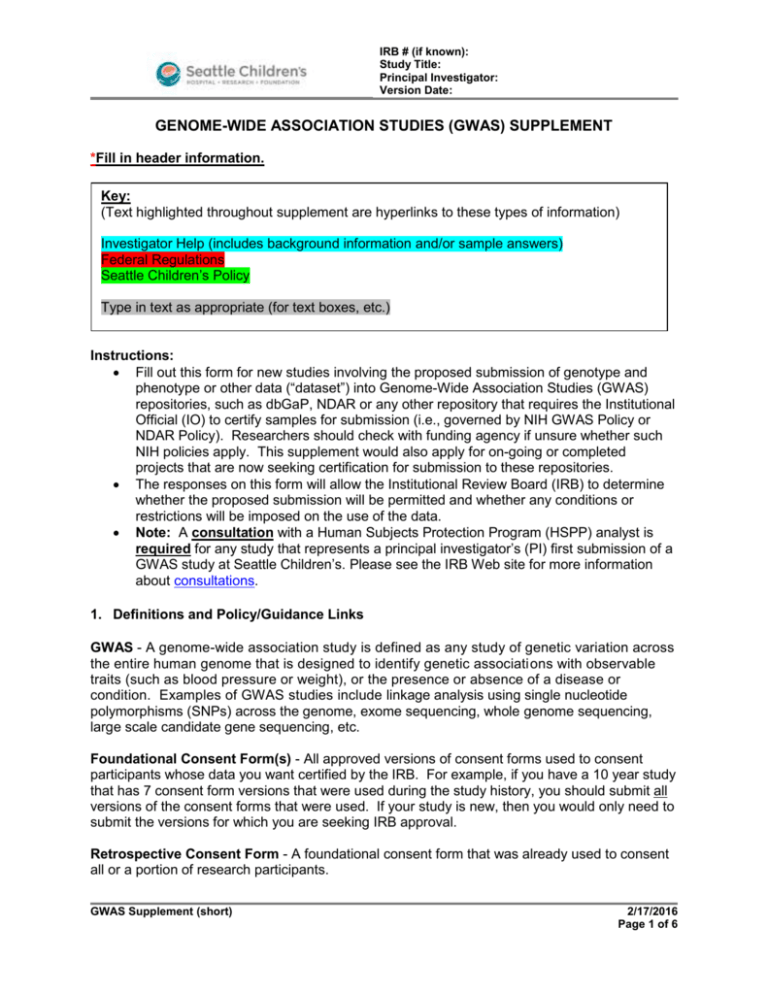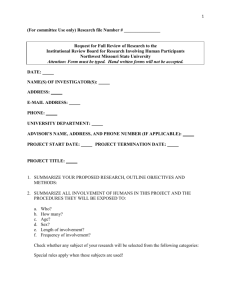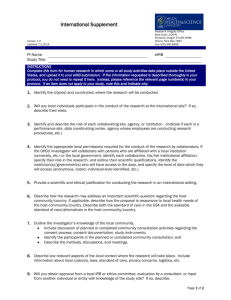Genome-Wide Association Studies Supplement
advertisement

IRB # (if known): Study Title: Principal Investigator: Version Date: GENOME-WIDE ASSOCIATION STUDIES (GWAS) SUPPLEMENT *Fill in header information. Key: (Text highlighted throughout supplement are hyperlinks to these types of information) Investigator Help (includes background information and/or sample answers) Federal Regulations Seattle Children’s Policy Type in text as appropriate (for text boxes, etc.) Instructions: Fill out this form for new studies involving the proposed submission of genotype and phenotype or other data (“dataset”) into Genome-Wide Association Studies (GWAS) repositories, such as dbGaP, NDAR or any other repository that requires the Institutional Official (IO) to certify samples for submission (i.e., governed by NIH GWAS Policy or NDAR Policy). Researchers should check with funding agency if unsure whether such NIH policies apply. This supplement would also apply for on-going or completed projects that are now seeking certification for submission to these repositories. The responses on this form will allow the Institutional Review Board (IRB) to determine whether the proposed submission will be permitted and whether any conditions or restrictions will be imposed on the use of the data. Note: A consultation with a Human Subjects Protection Program (HSPP) analyst is required for any study that represents a principal investigator’s (PI) first submission of a GWAS study at Seattle Children’s. Please see the IRB Web site for more information about consultations. 1. Definitions and Policy/Guidance Links GWAS - A genome-wide association study is defined as any study of genetic variation across the entire human genome that is designed to identify genetic associations with observable traits (such as blood pressure or weight), or the presence or absence of a disease or condition. Examples of GWAS studies include linkage analysis using single nucleotide polymorphisms (SNPs) across the genome, exome sequencing, whole genome sequencing, large scale candidate gene sequencing, etc. Foundational Consent Form(s) - All approved versions of consent forms used to consent participants whose data you want certified by the IRB. For example, if you have a 10 year study that has 7 consent form versions that were used during the study history, you should submit all versions of the consent forms that were used. If your study is new, then you would only need to submit the versions for which you are seeking IRB approval. Retrospective Consent Form - A foundational consent form that was already used to consent all or a portion of research participants. GWAS Supplement (short) 2/17/2016 Page 1 of 6 IRB # (if known): Study Title: Principal Investigator: Version Date: Prospective Consent Form - A foundational consent form that will be used at a future date to consent research participants. This usually applies for new studies, but could also apply to an older study that is adding either a new consent form or a consent form supplement for DNA collection. Investigator Help 2. GWAS Data Submission Certification Federal Regulations 2.1. This is a PROSPECTIVE Study (dataset is not yet in existence). Yes No 2.2. This is a RETROSPECTIVE Study (dataset is in existence). Yes No 2.3. This is both a RETROSPECTIVE and PROSPECTIVE Study (part of dataset is in existence and part is not yet in existence). Yes No 2.4. If the NIH GWAS policy is applicable, summarize here your plan to de-identify the dataset to be submitted and describe how your plan is consistent with the NIH GWAS Policy. 2.5 Please attach the following documents: Relevant Foundational Consent Form(s) (all approved versions of consent forms used to consent participants whose data you want certified) Data Sharing Plan for the dataset, if applicable. 3. Consent Form Considerations If you are creating consent forms for prospective data collection, the IRB will need to find that the information provided to participants is consistent with the GWAS Points to Consider Document. Investigator Help Please address the following for all approved consent form versions (both prospective and retrospective) for which you are seeking certification. Investigator Help GWAS Supplement (short) 2/17/2016 Page 2 of 6 IRB # (if known): Study Title: Principal Investigator: Version Date: Scope 3.1. Please indicate whether the consent form allows, precludes, or is silent/does not expressly preclude data sharing with regard to the below types of activity: Activity Genetic research or analysis. Future use and broad sharing of the participant’s coded phenotype and genotype data for research. Submission of the participant’s coded phenotype and genotype data to a government health research database for broad sharing to qualified investigators. Allows (identify where in the consent) Precludes (identify where in the consent) Yes Page #: No Yes Page #: No Yes Page #: No Yes Page #: No Yes Page #: No Yes Page #: No Silent, or does not expressly Preclude 3.2. For retrospective consent forms only: 3.2.1. If the consent form is either silent or does not expressly preclude any of the activities listed above, do you plan to seek re-consent? Yes A copy of the consent for this purpose is attached. No Provide justification for the IRB about why re-consent will not be sought. Please address the following points (for Waiver of Consent): 3.2.1.1. Why the posting of data from your research to the database involves no more than minimal risk to the participants from whom the samples were originally obtained. 3.2.1.2. Why the posting of data will not adversely affect the rights and welfare of the participants from whom the samples were originally obtained. 3.2.1.3. Under what circumstances will participants be presented with relevant information should it become available. 3.2.1.4. Why re-consenting the participants is not feasible/appropriate. GWAS Supplement (short) 2/17/2016 Page 3 of 6 IRB # (if known): Study Title: Principal Investigator: Version Date: **All other sections below refer to both retrospective and prospective consent forms. 4. Restrictions 4.1. Are there restrictions on the types of subsequent research using the participant’s phenotype and genotype data? Yes Explain. No Investigator Help 4.2. Are there restrictions on the location of such research? Yes Explain. No Investigator Help 4.3. Are there restrictions on duration of storage and use of human specimens and/or phenotype and genotype data derived from such specimens? Yes Explain. No Investigator Help 4.4. Are there limitations on who can use the participant’s specimens and/or phenotype and genotype data? Yes Explain. No Investigator Help 5. Potential Benefits 5.1. Does the consent form discuss the possibility that benefits may accrue broadly to the public through the advancement of science and understanding of health and disease? Yes No Explain. 6. Risks 6.1. Please indicate whether the consent forms discuss any of the following risks associated with genetic or genomic research: 6.1.1. Do the consent form(s) discuss risks of broad sharing of phenotype and genotype data? Yes GWAS Supplement (short) 2/17/2016 Page 4 of 6 IRB # (if known): Study Title: Principal Investigator: Version Date: No 6.1.2. Do the consent form(s) discuss privacy risks of data sharing (e.g., the possibility that the coded data may be released to members of the public, insurers, employers, and law enforcement agencies)? Yes No 6.1.3. Do the consent form(s) discuss the risks of computer security breaches relevant to maintaining data in an electronic format? Yes No 6.1.4. Do the consent form(s) discuss relevant risks to relatives or identifiable populations or groups? Yes No 7. Return of Research Results 7.1. Does the consent form include a discussion of whether or not human specimens or research results will be returned to participants? Yes Explain under what conditions and how this will occur. No 8. Privacy and Confidentiality 8.1. Do the consent form(s) address how the confidentiality of individually identifiable information about the participant will be protected? Yes Describe. No 8.2. Describe the security and oversight provisions of the GWAS database if it is a database other than dbGaP (and identify the database). 8.3. Is the description of confidentiality measures described in the consent form consistent with the gate keeping and security measures of the GWAS database that the data will be deposited into? Yes No Describe. 9. Withdrawal of Consent 9.1 Do the consent form(s) address whether a participant can withdraw his/her phenotype and genotype data from research use? Yes Explain. No Explain. GWAS Supplement (short) 2/17/2016 Page 5 of 6 IRB # (if known): Study Title: Principal Investigator: Version Date: 9.2 Do the consent form(s) state that data cannot be withdrawn after it has been released to other researchers? Yes Explain. No Explain. 10. Commercial Use 10.1. Do the consent form(s) allow for the commercial use of the participant’s phenotypic and genotypic data? Yes No Describe any restrictions. Silent (Consent form is silent about commercial use) 11. Other 11.1. Is there any other information in the consent form(s) that is inconsistent with the information provided about the NIH GWAS data repository and GWAS policies and procedures? Yes Describe. No GWAS Supplement (short) 2/17/2016 Page 6 of 6








